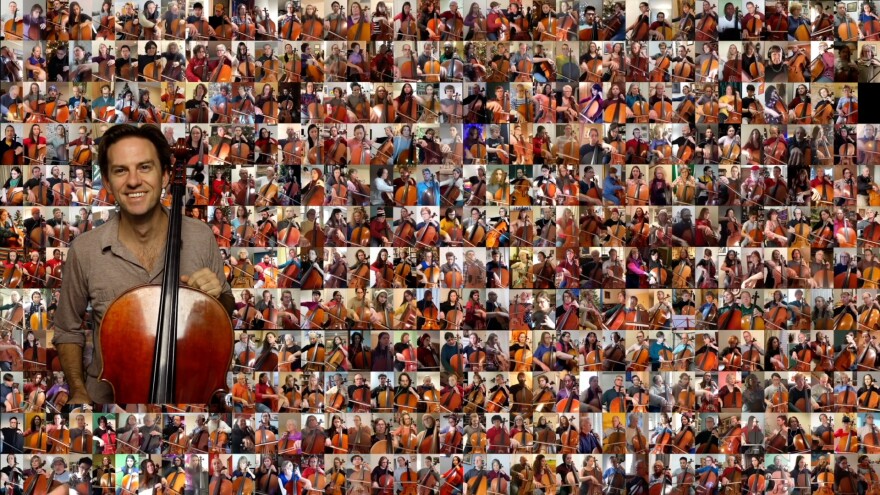“The community that’s being created is probably the most important part of the whole thing,” says Tony Rogers about his creation The Covid Cello Project. “It’s really cool that these people are feeling connected that otherwise would never be connected whatsoever, just because we all play the cello.”
The project started a year ago, when the Austin Cello Choir had to scuttle plans for their then-upcoming spring 2020 concert. As director of the choir, Rogers wanted to come up with something to give his fellow cello players a project to work on while they weren’t able to play for a live audience. Having seen some other Covid-inspired online videos, Rogers decided to do something similar with the Austin Cello Choir.
“I thought, ‘well, I’ll invite our cellists to do a video project,’” Rogers says. “And then I said, ‘why don’t I just invite the world?’”
For the first installment of the project, 17 cellists, all from the United States, recorded themselves playing Bach’s Toccata in G minor, and Rogers assembled the recordings into a video for youtube. From there, more videos followed, each featuring more players than the one before, as cellists from all over the world started joining in and sending their recordings to Rogers.
“Some people just out of the woodwork participated, without knowing me or anything about it,” Rogers says. “They followed the directions that I posted up on the website and it was off. And it’s been off and running.”
For installment number two, Rogers selected “Take on Me,” the 1984 hit by Norwegian pop band A-ha. That one featured 23 players from three countries. “Everybody Wants to Rule the World,” another ‘80s hit (by Tears for Fears) followed, and the participants jumped to 70 cellists from 18 countries.
Ten more videos have followed so far, featuring a mix of pop and rock songs along with some classical pieces. “That’s kind of the idea behind the Austin Cello Choir, too,” Rogers says. “It’s everything from Bach to Bjork.” Each installment has seen an increase in participating players – 120 cellists joined in for the aria from Bachianas Brasileiras No. 5 by Heitor Villa-Lobos, 179 played on Led Zeppelin’s “Kashmir,” and 288 took part in ELO’s “Mr. Blue Sky.”
The next installment (which will be the thirteenth) of The Covid Cello Project will be the biggest one yet – Rogers says some 543 cellists from 40 or so countries will be playing on “The Saga of Harrison Crabfeathers” by Steve Kuhn.
Though the project started as a direct response to the Covid-19 pandemic, Rogers says it’ll live on in post-pandemic times, even if the name doesn’t. “We’re looking at rebranding,” he says. “Of course, you know, we don’t want to say we’re The Covid Cello Project way after Covid is over… so we’re looking at some new names and things like that. Yeah, I fully intend to keep this going.
“I’m not very good at marketing this thing, but it seems to not matter, because it’s growing on its own,” Rogers says. “And that’s, I think, really beautiful and I really like it. It was just basically kind of giving people – players, cello players who didn’t have a way to play or a group to play with anymore – something to do. A project to participate in, to create something hopefully worthwhile, meaningful, and beautiful at times. And fun at other times and silly at other times.”
All installments of The Covid Cello Project can be found at covidcelloproject.com.





